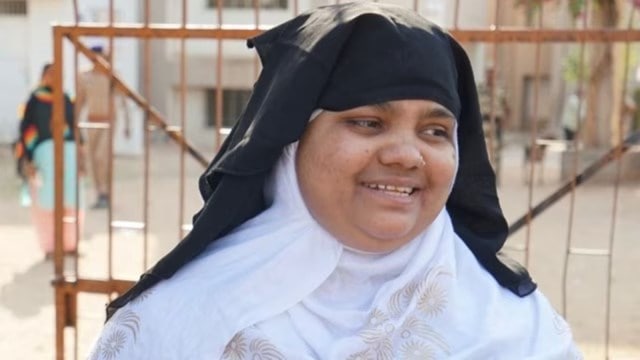Two Bilkis Bano case convicts move SC against verdict that cancelled their remission
The plea, filed through Advocate Rishi Malhotra, pointed out that in Rupa Ashok Hurra’s case, the SC “had devised a mechanism in the form of ‘Curative Petition’ which can be filed by a concerned party after dismissal of a Review Petition”.

Two of the convicts in the Bilkis Bano case have approached the Supreme Court contending that the January 8, 2024, judgement cancelling their remission was in violation of the law regarding the procedure for challenging an SC order and deserves to be set aside.
The plea by Radheshyam Bhagwandas Shah and Rajubhai Babulal Soni said that the January 8 order “is directly in teeth of the Constitution Bench decision in Rupa Ashok Hurra’s (case)…and the same needs to be set aside, as if the same is permitted then it would lead to not only judicial impropriety but to uncertainty and chaos as to which precedence of law has to be applied in future. In other words, if any party was not satisfied with a Supreme Court Judgment on an issue, he would be entitled to file a Writ Petition challenging the said Judgment by taking recourse to the law laid down in Bilkis’s case”.
The plea, filed through Advocate Rishi Malhotra, pointed out that in Rupa Ashok Hurra’s case, the SC “had devised a mechanism in the form of ‘Curative Petition’ which can be filed by a concerned party after dismissal of a Review Petition”.
Deciding a writ petition of Shah, a two-judge bench of the SC had on May 13, 2022, ruled that the Gujarat government was the appropriate government to decide his remission plea in accordance with the state’s 1992 remission and premature release policy.
The review petition against this judgement was dismissed on December 16, 2022. The Gujarat government then allowed remission to all the 11 convicts in the case, but this was challenged before the SC by Bano. Deciding Bano’s plea on January 8, another two-judge bench of the court held that the Gujarat government was not the “appropriate government” to decide the remission applications.
It also held that the May 13, 2022, judgement “is a nullity and is non est in law since the said order was sought by suppression of material facts as well as by misrepresentation of facts…and therefore, fraudulently obtained at the hands of this Court” and consequently, “all proceedings taken pursuant to the said order also stand vitiated and are non est in the eye of law”.
Shah said due the diametrically opposite views of two benches of equal strength, has given rise to an “anomalous
situation”.
He added that as per Rupa Ashok Hurra case, the subsequent Co-ordinate would have had to refer it to a larger bench. “In another words, a fundamental issue arises for consideration as to whether a subsequent Co-ordinate Bench can set aside its earlier Judgment rendered by its earlier Co-ordinate Bench and pass contradictory orders/judgments overruling its earlier view or the proper course would have been to refer the matter to a larger Bench in case it felt that the earlier Judgment was passed in wrong appreciation of law and facts,” it said.
He added that as per the law laid down in the case of Rajiv Gandhi assassination case convict Hariharan, the Central government would be the appropriate government where the investigation was done by the CJI.
“Thus, the Judgment in Bilkis’s case…whereby it has held that the appropriate Government would be State of Maharashtra and not the State of Gujarat on that count also would be per-incuriam the Constitution Bench decision in Sriharan’s case,” he added and urged the court to “please clarify and subsequently direct that as to which Judgment of its Co-ordinate Bench would be applicable i.e. one which has been delivered in Radhey Shyam’s case…or one which is subsequently in Bilkis’s case…”







